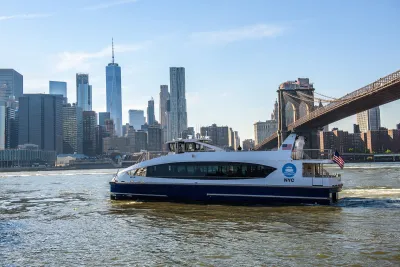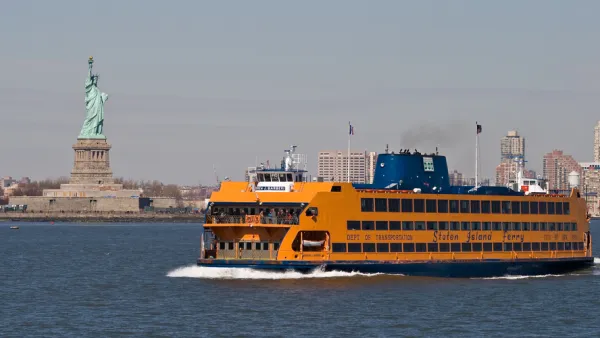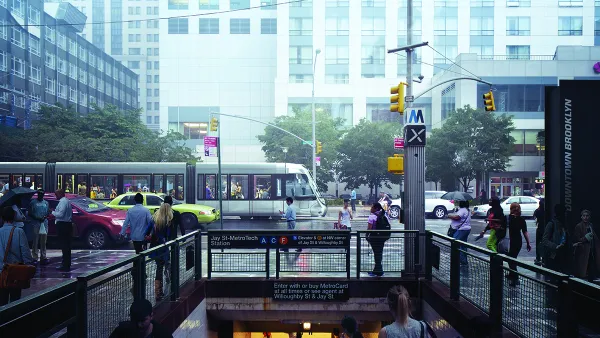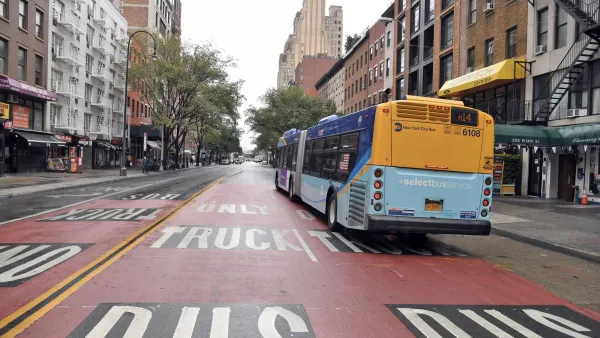NYC Ferry, which opened in May 2017, would double in size if Mayor Bill de Blasio's budget proposal moves forward.

[Updated: This article has been updated to correct an error in the headline.]
New York City Mayor Bill de Blasio has announced a new budget proposal that would allocate $300 million to double the size of the NYC Ferry system, reports Will Bredderman.
The idea of expanding the NYC Ferry system has already met with criticism for taking focus away from needed improvements at the MTA.
But the New York City Economic Development Corp., which de Blasio controls, says that each passenger's voyage—though priced at $2.75 to match subway and bus fares—will still require a $6.60 taxpayer subsidy. This is several times larger than the government's cost for each ride on the subway system, which carries between 5 million and 6 million passengers every day. Critics also say the ferries favor waterfront communities that are often more affluent than the average inland enclave.
While Mayor de Blasio has found this $300 million for a ferry service he obviously sees as part of his legacy, his administration remains resistant to providing additional city support for the state-run MTA.
The council has pushed the mayor to set aside $212 million from the budget to finance reduced-cost MetroCards for low-income New Yorkers. The mayor again called this a "good idea," but dismissed it as extra city funding for the MTA, which he finds especially unpalatable after the state budget forced his administration to cough up $418 million toward an "emergency" repair plan.
The proposed $300 million in funding for NYC Ferry would fund the acquisition of "350-passenger vessels, improvements to piers and docks, and a second facility for boat repairs and maintenance," according to Bredderman. The article includes more details about the results of NYC Ferry service in its first full year of operation.
FULL STORY: De Blasio tries to justify sinking another $300 million into ferries

Analysis: Cybertruck Fatality Rate Far Exceeds That of Ford Pinto
The Tesla Cybertruck was recalled seven times last year.

National Parks Layoffs Will Cause Communities to Lose Billions
Thousands of essential park workers were laid off this week, just before the busy spring break season.

Retro-silient?: America’s First “Eco-burb,” The Woodlands Turns 50
A master-planned community north of Houston offers lessons on green infrastructure and resilient design, but falls short of its founder’s lofty affordability and walkability goals.

Test News Post 1
This is a summary

Analysis: Cybertruck Fatality Rate Far Exceeds That of Ford Pinto
The Tesla Cybertruck was recalled seven times last year.

Test News Headline 46
Test for the image on the front page.
Urban Design for Planners 1: Software Tools
This six-course series explores essential urban design concepts using open source software and equips planners with the tools they need to participate fully in the urban design process.
Planning for Universal Design
Learn the tools for implementing Universal Design in planning regulations.
EMC Planning Group, Inc.
Planetizen
Planetizen
Mpact (formerly Rail~Volution)
Great Falls Development Authority, Inc.
HUDs Office of Policy Development and Research
NYU Wagner Graduate School of Public Service




























